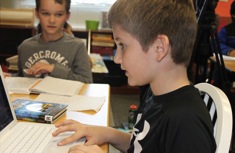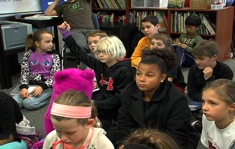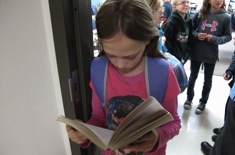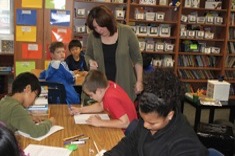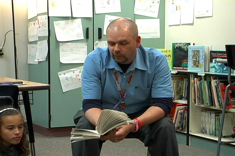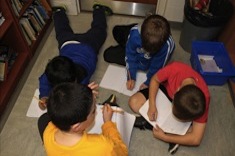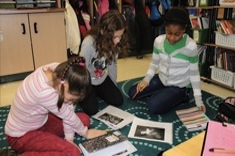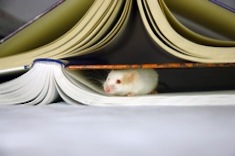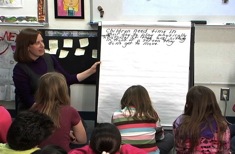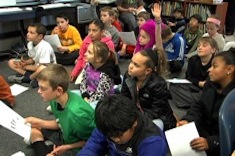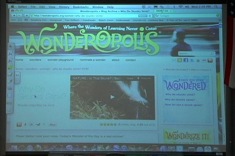4th
Latest Content
Conferring in 4th Grade: The Dilemma of Multiple Novels
Melissa Styger confers with a fourth-grade student who is reading two novels simultaneously, and shares her criteria for determining when it’s appropriate for students to read multiple texts.
Using Pinterest for Professional Development
Franki Sibberson finds Pinterest is a useful tool for professional development.
Using Technology to Connect Young Readers and Writers
Julie Johnson reflects on how technology is changing her own reading community, and builds on this knowledge to connect readers and writers in her classroom with others through the Internet.
Fourth Grade Writing Workshop Minilesson on Focusing
Franki Sibberson shares some tips and strategies with her fourth graders from the web for focusing and organizing their writing.
What Data Will You Be Collecting?
Tony Keefer explains why attitudinal survey data is important to collect early in the year, and shares different reading surveys he uses with students to understand their needs in the first six weeks of school.
Rethinking the Assessment Binder
Franki Sibberson’s dilemma? How to file every evaluation so it is organized and accessible (since she never knows when someone might ask for it), while still finding a way to keep the assessments she needs every day at her fingertips.
Daily Routines: Finding Time for What Matters
Ann Marie Corgill provides some guiding questions to help teachers figure out priorities in their schedules for daily routines.
First Read Alouds (ROUND-UP)
Choice Literacy contributors share their picks for the first read aloud of the year.
Planning a Read Aloud Sequence to Launch the School Year
Tony Keefer shares the three essential questions that guide his process of selecting first read alouds.
Whole Group Writing Share
Franki Sibberson’s fourth graders use the whole-class writing share time to discuss writing series they are working on (including blog interviews and book reviews), with an eye toward collaborating with classmates.
Using Instagram to Sell Summer Reading Options
Tony Keefer taps into the Instagram craze among his students, and finds it is an ingenious tool for encouraging summer reading while kids are on vacation.
Grateful Journals
Beth Lawson began her own gratitude journal as a troubled teen, and finds that the daily routine of Grateful Journals is a powerful tool for reflection and building community in the intermediate grades.
Conferring with Ben
Franki Sibberson confers with Ben, a fourth-grade writer trying to figure out the best audience for his writing when technology presents many options.
Decoding and Meaning: Conferring in 4th Grade
Tony Keefer confers with Amanda, a fourth grader who comprehends texts well, but struggles at times with fluency, decoding, and book selection.
Conferring with Pierce
Franki Sibberson demonstrates how much ground can be covered in a three-minute conference with a student. She helps fourth grader Pierce think through the audience for his writing, how to add visuals to blog posts, and enlists him to teach others new skills as he acquires them.
Death in Books: Finding Our Way After Loss
Books can help children deal with the toughest challenges in life. In a new booklist, Andie Cunningham shares her top picks for stories about characters grappling with the death of a loved one.
Using Shared Writing to Build Argument Skills
Shari Frost explains the power of shared writing in intermediate classrooms, especially for struggling learners.
They Can Sing and Define It, But Can They Use It?
Melissa Styger rethinks the way she teaches reading strategies, emphasizing putting them to use over defining them.
The Lunch Lady and Gender in Reading
Franki Sibberson has her students read a blog post about books written for boys and girls, which begins a fascinating discussion with the class about gender in reading choices.
Shared Reading in the Intermediate Grades
Shari Frost explains why shared reading is valuable for older students, with examples of the practice in the intermediate grades.
Between the Brain and Page: Working with Gifted Student Writers
Michelle Kelly explains how gifted student writers have needs that vary greatly. "Carolyn the Voice," "Alan the Verbose," and "Bailey the Perfectionist" are all gifted writers who need different workshop structures and guidance to do their best work.
Understanding the Middle East Through Children’s Literature (BOOKLIST)
Sheiks, harems, and terrorists — the stereotypes of the middle east from popular culture may not be realistic, but they sure are pervasive. Ruth Shagoury and Andie Cunningham find authentic alternative views to present to children in their new booklist.
Embracing the Growth Mindset with Audiobooks
Jennifer Vincent explains how recorded texts were a potent tool for reaching a struggling fourth-grade reader.
Tips for Effective Family Communication from “The Mouse”
Jennifer Vincent details strategies and shares survey templates she uses in reaching out to families.
Teacher-as-Writing-Model Minilesson in Fourth Grade
Beth Lawson models her process as a writer for her fourth-grade students, describing her emotions as well as creating a draft.
March Book Madness
Basketball’s March Madness has many possibilities in schools. Tony Keefer tries a similar format with brackets and voting for March Book Madness.
Beyond Text Features in Nonfiction Instruction
Franki Sibberson considers how the demands of the Common Core and the complex mix of online and offline nonfiction texts are changing the skills she teaches students.
Science Challenge
Franki Sibberson’s fourth-grade students share results from the weekly science challenge.
Getting More from Wonderopolis
Franki Sibberson uses Wonderopolis with her 4th grade students, helping them learn to research and dig more deeply at the site.
From “Show Me the Lessons” to Sustainable Planning (Part 4 of the Opinion/Argument Writing Series)
This is the final installment in Heather Rader's series on argument and opinion writing in the intermediate grades.
Browse Content By
Type
Category
- Assessment Tools
- Big Fresh Archives
- Booklists
- Choice Numeracy
- Classroom Design
- Common Core
- Community Building
- Conferring
- Content Literacy
- Digital Literacy
- English Language Learners
- Equity
- Family Relations
- Free Samples
- Guiding Groups
- Leadership
- Literacy Coaches
- Mentor Texts
- Minilessons
- New Teacher Mentors
- Podcasts
- Poetry
- Quote Collections
- Reading Strategies
- Self Care
- Struggling and Striving Learners
- Talking and Listening
- Teacher Study Groups
- Teaching Reading
- Teaching Writing
- Word Study and Vocabulary
Author
- Melissa Quimby
- Nawal Qarooni
- Gwen Blumberg
- Julie Cox
- The Lead Learners
- Hannah Tills
- Josie Stewart
- Ruth Metcalfe
- Mallory Messenger
- Becca Burk
- Jodie Bailey
- Vivian Chen
- Mary Brower
- Tiffany Abbott Fuller
- Stephanie Affinito
- Ruth Ayres
- Leigh Anne Eck
- Heather Fisher
- Shari Frost
- Julie Johnson
- Suzy Kaback
- Gigi McAllister
- Shirl McPhillips
- Melanie Meehan
- Cathy Mere
- Debbie Miller
- Tara Barnett and Kate Mills
- Tammy Mulligan
- Dana Murphy
- Bitsy Parks
- David Pittman
- Brenda Power
- Heather Rader
- Matt Renwick
- Mandy Robek
- Christy Rush-Levine
- Gretchen Schroeder
- Jen Schwanke
- Brian Sepe
- Katherine Sokolowski
- Stella Villalba
- Jennifer Vincent
Grade Level
Choice Literacy Membership
Articles
Get full access to all Choice Literacy article content
Videos
Get full access to all Choice Literacy video content
Courses
Access Choice Literacy course curriculum and training



